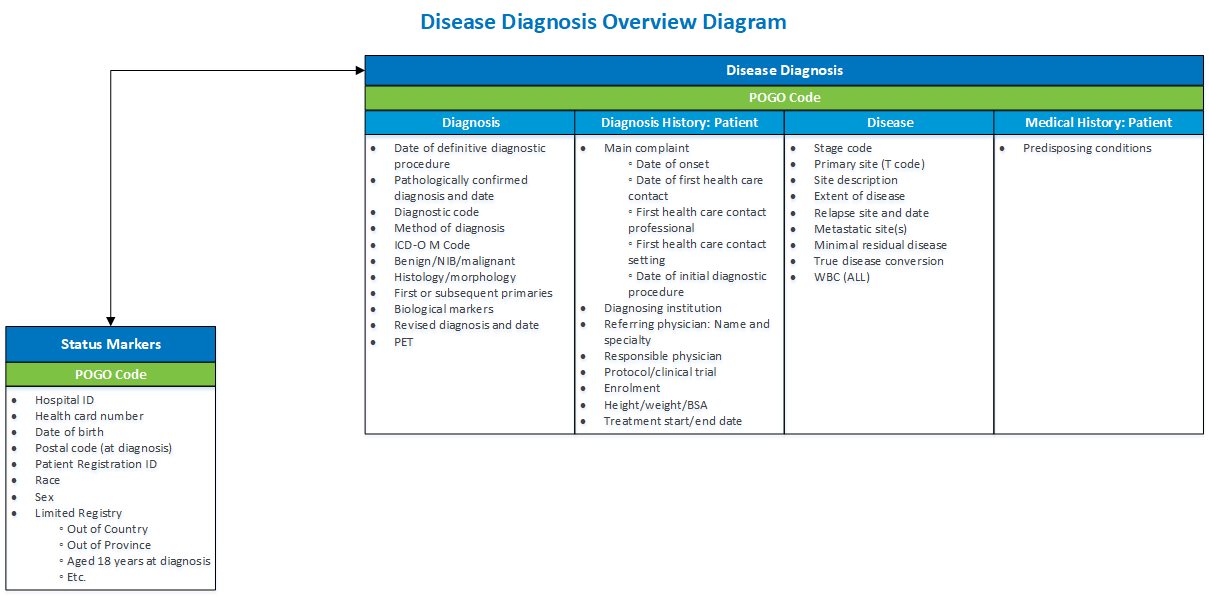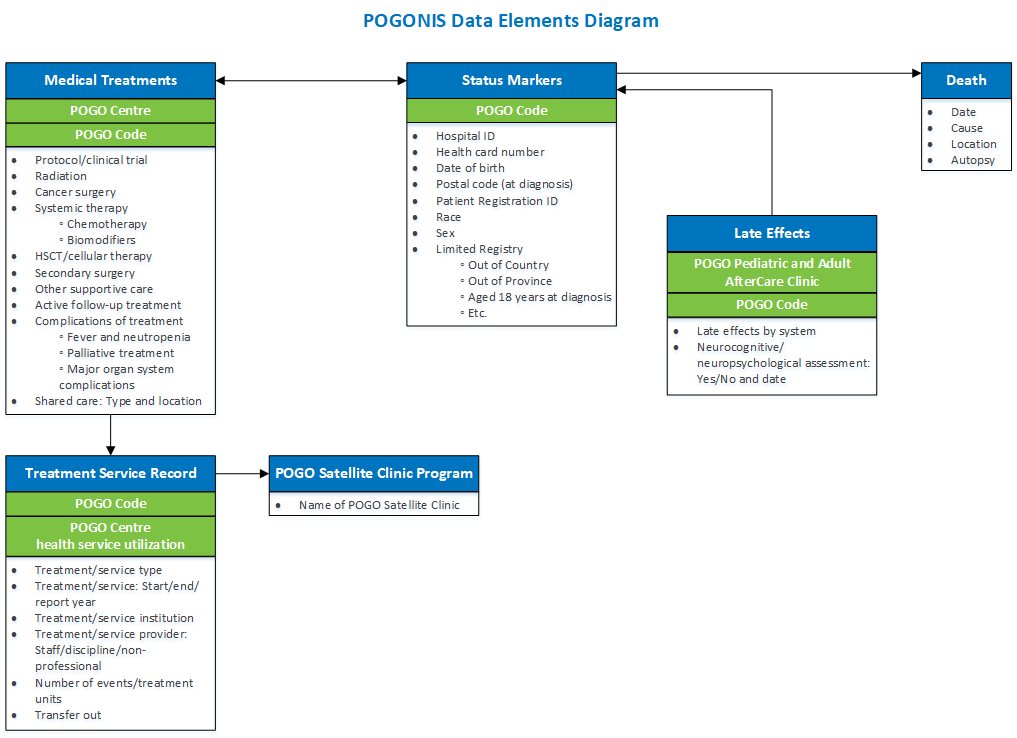Data Anatomy
POGONIS is POGO’s active registry and database on childhood cancer in Ontario. It is a rich source of data, which are available to inform childhood cancer system policy and planning and for research purposes.
POGONIS Data Dictionary
For a copy of the POGONIS Data Dictionary Manual, please contact the POGO Data team.
Disease Diagnosis Overview
Disease Diagnosis Overview Diagram
Status Markers
- POGO Code
- Hospital ID
- Health Card Number
- Date of birth
- Postal code (at diagnosis)
- Patient Registration ID
- Race
- Sex
- Limited Registry
- Out of Country
- Out of Province
- Aged 18 years at diagnosis
- Etc.
Disease Diagnosis
- POGO Code
- Diagnosis
- Date of definitive diagnostic procedure
- Pathologically confirmed diagnosis and date
- Diagnostic code
- Method of diagnosis
- ICD-O M Code
- Benign/NIB/malignant
- Histology/morphology
- First or subsequent primaries
- Biological markers
- Revised diagnosis and date
- PET
- Diagnosis History: Patient
- Main complaint
- Date of onset
- Date of first health care contact
- First health care contact professional
- First health care contact setting
- Date of initial diagnostic procedure
- Diagnosing institution
- Referring physician: Name and speciality
- Responsible physician
- Protocol/clinical trial
- Enrolment
- Height/weight/BSA
- Treatment start/end date
- Main complaint
- Medical History: Patient
- Predisposing conditions
- Disease
- Stage code
- Primary site (T code)
- Site description
- Extent of disease
- Relapse site and date
- Metastatic site(s)
- Minimal residual disease
- True disease conversion
- WBC (ALL)
POGONIS Data Elements
POGONIS Data Elements Diagram
Death Record
- Date
- Cause
- Location
- Autopsy
Medical Treatments
- POGO Centre
- POGO Code
- Protocol/clinical trial
- Radiation
- Cancer surgery
- Systemic therapy
- Chemotherapy
- Biomodifiers
- HSCT/cellular therapy
- Secondary surgery
- Other supportive care
- Active follow-up treatment
- Complications of treatment
- Fever and neutropenia
- Palliative treatment
- Major organ system complications
- Shared care: Type and location
Treatment Service Record
- POGO Code
- POGO Centre health service utilization
- Treatment/service type
- Treatment/service: Start/end/report year
- Treatment/service institution
- Treatment/service provider: Staff/discipline/non-professional
- Number of events/treatment units
- Transfer out
POGO Satellite Clinic Program
- Name of POGO Satellite Clinic
Late Effects
- POGO Pediatric and Adult AfterCare Clinic
- POGO Code
- Late effects by system
- Neurocognitive/neuropsychological assessment: Yes/no and date
Related Articles
Graduation Coach for Black Students Promotes more than Academic Success
February 23, 2023
POGO Counsellors strive for excellence in providing culturally-aware support to the diverse group…
When Your Brain Tumour Can’t Be Cured
January 20, 2023
By Maryam Kraishi I was diagnosed with cancer when I was just four years old, but what is…
Health Monitoring at a POGO AfterCare Clinic Gives me Peace of Mind (Most of the Time)
January 19, 2023
As a survivor of childhood cancer, I know many would think that once treatment ends, the struggle…
Reflections on the 2022 POGO Symposium by Dr. Adam Fleming
January 19, 2023
CNS tumours under the microscope The return of the POGO Multidisciplinary Symposium on Childhood…
POGO Helps Widen Access to Clinical Trials for Childhood Cancer Care
January 19, 2023
The Challenge Childhood cancer outcomes have seen remarkable improvements thanks to large-scale…
Key Messages


YOU can be a champion for kids with cancer!
With your help, we will ensure that kids and youth with cancer, their families and survivors of childhood cancer have equitable access to the best care for the best possible outcomes.

